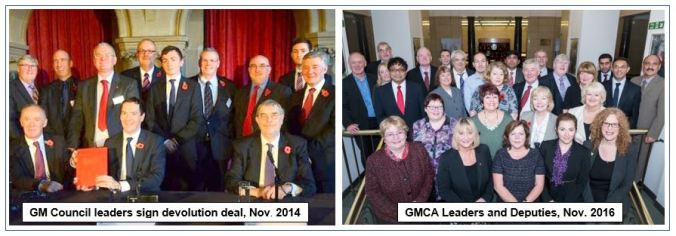Chris Game
Combined Authorities, elected mayors, women’s representation, Greater Manchester CA, Liverpool City Region CA, West Midlands CA, Andy Burnham, Steve Rotheram, Andy Street, Fawcett Society, Liverpool Women’s Leadership Group
Combined Authorities have had a women problem – or rather, a lack-of-women problem – pretty well from their inception, and the much recycled picture of 11 very male and pale, if not stale, Greater Manchester council leaders signing an even paler George Osborne’s first devolution deal (see below). It was re-emphasised with the 32/7 m/f imbalance of mayoral candidates and 6/0 imbalance of the victors. In the West Midlands, though, we have a mega-problem – to which this blog, about CAs’ governance arrangements, will suggest there are two dimensions: why it exists, and what isn’t being done about it.
It exists first because the WMCA is both bigger and more complex than the other mayoral CAs. In addition to Mayor Andy Street, it comprises seven constituent members – the metropolitan boroughs, whose leaders are the Mayor’s ‘Portfolio holders’ or cabinet – plus 13 non-constituent members: three Local Enterprise Partnerships and 10 of the councils they cover.
All are represented on the CA Board, constituent councils by two elected members each (rather than other CAs’ one), non-constituent bodies by one each. Adding several accredited Observers and a Co-optee makes 33 – three or more times the size of other mayoral CAs. Finally, and with potential representational significance, all members have a nominated Substitute Member to attend and act, if required.
Of the WMCA’s 33 members, all but one are men, the single, albeit distinguished, exception being Councillor Izzy Seccombe, Leader of Warwickshire County Council, a non-constituent member. The other CAs are smaller, but their gender disproportionality similar. None have more than one woman board member, the overall split being 71-3 or 4% women – a situation, moreover, that was both predictable and predicted.
In March, the Fawcett Society published an ‘Evidence Document’ on Women in Greater Manchester in conjunction with the local women’s campaign group, DivaManc. It concluded by asking all candidates to respond to five fairly demanding “Mayoral Pledges and Calls to Action”, headed by “Gender-balanced leadership and representation across Greater Manchester”.
All candidates duly signed, including odds-on favourite, Labour’s Andy Burnham. The Fawcett document then outlined the hurdles involved in the “gender-balanced representation” pledge, and the likelihood that, whatever the election result, “only one of 11 GMCA members will be a woman”. For the ten constituent councils had already chosen their leader/elected mayor as their single permitted GMCA member, and only one at the time was a woman – Jean Stretton, Labour leader of Oldham Council, whose own cabinet, probably not by chance, is gender-balanced.
Signing the Fawcett pledge, therefore, would commit the new Mayor to:
- Call for the Government to amend this policy, requiring each constituent council’s CA representation to comprise a man and a woman.
- If that failed, request that 50% of the councils nominate a senior woman councillor to attend in place of the leader/mayor; or ensure that all substitute members are women, that they attend on an equal rota, and have substantial roles and responsibilities.
- If a man, appointing a woman as Deputy Mayor.
The day following his election, new Mayor Andy Burnham demonstrated his commitment to the pledge by appointing two deputies, one being Baroness Beverley Hughes – former Leader of Trafford Council, Labour MP and Minister – as Deputy Mayor for Policing and Crime, making 11 cabinet portfolio holders, including two women. Hughes is the only salaried deputy, her appointment enabled by the previous portfolio holder (as GM Police & Crime Commissioner) being interim mayor Tony Lloyd – whose own multi-ethnic selection of six men and 14 women deputies had, even if temporarily, presented a strikingly un-stale-pale-male picture.

Unable to replicate that picture, Mayor Burnham has nevertheless demonstrated that constitutions are there to be reconstituted. An amended GMCA constitution now requires appointed portfolio holders to nominate assistant leads of a different gender to ensure balanced representation in meetings and decision-making. Committees, panels and boards that advise the Mayor will also be gender-balanced wherever possible.
Down the M62, though, Liverpool City Region CA Mayor, Steve Rotheram, was finding life tougher, his seven-member, all-male cabinet, plus three male co-optees, prompting considerable local protest. He had “attempted to bring two women into his cabinet, but was blocked by other members”. One – Merseyside Police & Crime Commissioner Jane Kennedy – has since become a non-voting co-optee, and six of his seven specialist Mayoral Advisors are women. Liverpool City Council Mayor Joe Anderson has also nominated Councillor and former Merseyside Police Commissioner Ann O’Byrne to represent him on the LCR cabinet, making her the only woman with voting rights.
Liverpool Women’s Leadership Group, though, are unappeased. In a recent open letter referring to Greater Manchester’s example, they are “appalled that the LCR cabinet is made up entirely of men”, and call on all cabinet members with voting rights “to redress the enduring gender imbalance by nominating a woman from your cabinet to take your place”.
And so back to the West Midlands, where new Mayor Andy Street appears to acknowledge the WMCA’s socio-economic unrepresentativeness – an issue that was “referenced many times on the campaign trail [and] would need addressing in the weeks and months ahead”. It wasn’t, however, mentioned in his 48-page, nearly 250-pledge manifesto, and the emphasis now was clearly on months, not weeks. Rather than follow the Fawcett/Burnham route, his single Deputy is fellow Conservative, Solihull Council leader, and former CA Chairman Bob Sleigh.
Over the now months, there have been several impressive appointments of women as WMCA Chief Executive and senior officers. Also an announced WM Leadership Commission, chaired by Anita Bhalla, OBE, “to improve opportunities for communities and groups currently under-represented in the leadership of the West Midlands.” No specific reference to women, though, or their Board representation, let alone to doing anything or amending the WMCA Constitution.
In conclusion: I fully recognise that some, women undoubtedly included, will argue that women’s inclusion and representation by themselves say little about either the significance of any posts to which they’re appointed, or women’s status in the political system – and of course they’re right. My simpler point is that exclusion and non-representation DO say something – something rather important.
 Chris Game is a Visiting Lecturer at INLOGOV interested in the politics of local government; local elections, electoral reform and other electoral behaviour; party politics; political leadership and management; member-officer relations; central-local relations; use of consumer and opinion research in local government; the modernisation agenda and the implementation of executive local government.
Chris Game is a Visiting Lecturer at INLOGOV interested in the politics of local government; local elections, electoral reform and other electoral behaviour; party politics; political leadership and management; member-officer relations; central-local relations; use of consumer and opinion research in local government; the modernisation agenda and the implementation of executive local government.